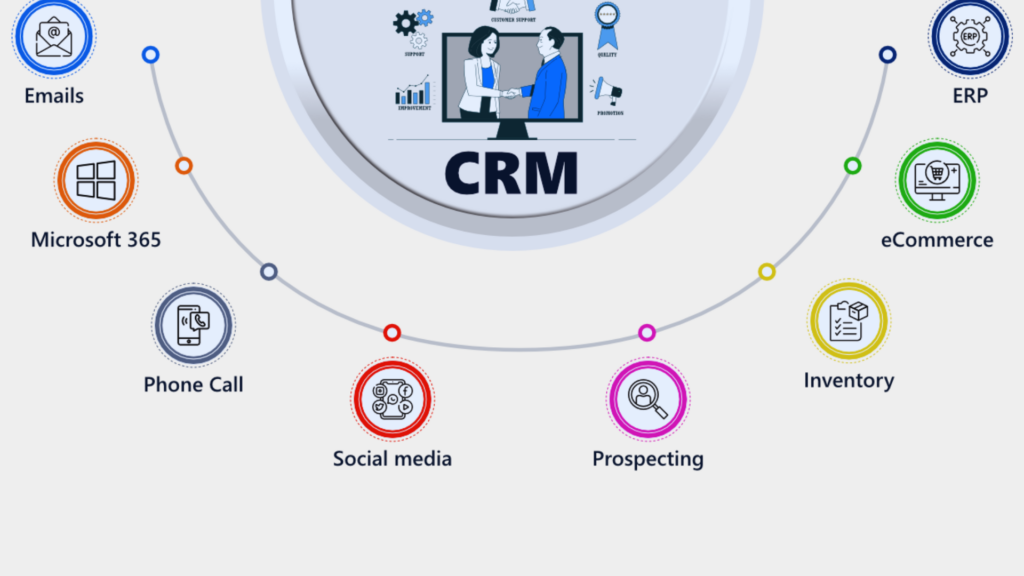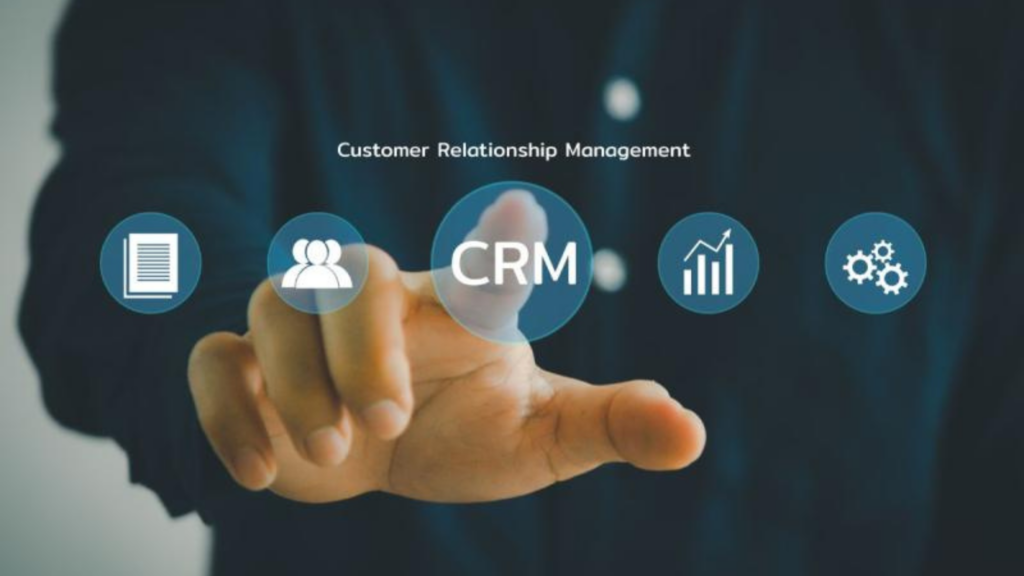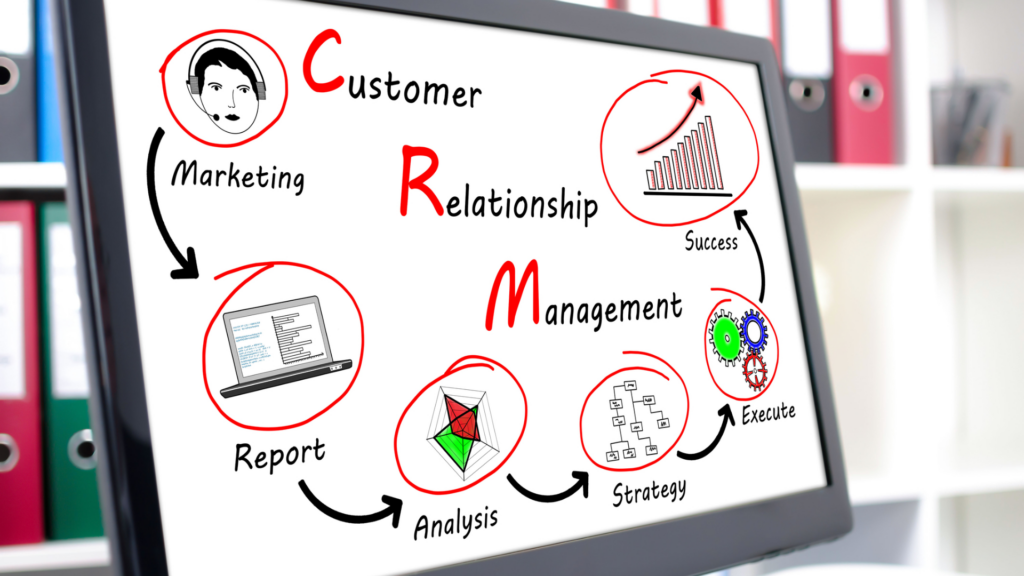
The digital transformation of the business landscape has elevated Customer Relationship Management (CRM) from a supporting tool to a centerpiece of modern marketing strategies. CRM, in its essence, is a multifaceted CRM software designed to act as the nerve center of customer data, a platform that unifies sales teams, marketing efforts, and customer service. It encapsulates the complexities of managing customer relationships, simplifying the ever-expanding pool of customer data for marketing managers.
This article explores CRM for marketing managers, primarily assessing whether this technology serves as an additional gadget in the marketer’s tool belt or as a game-changer in orchestrating marketing automation and crafting compelling marketing strategies.
The evolution of CRM—a term that resonates particularly with Marketing Managers—reflects a shift from rudimentary solutions to dynamic, intelligent systems that have become integral to marketing success.
According to a study by PRNews, the CRM market is expected to reach over $89.9 billion in revenue by 2025, reflecting its critical role in business operations across various sectors.

CRM began as a manual process of maintaining customer information, which was crucial for marketing managers and sales teams in keeping track of interactions and client data. In this era, CRM for Marketing Managers was synonymous with ledgers and Rolodexes, serving as the foundation for what was to come.
As the digital era took shape, CRM for marketing underwent a transformation propelled by technological innovations. The internet and cloud computing revolutionized CRM software, enabling marketing managers to access their CRM systems anywhere and making customer data more accessible and actionable. According to global news research, the global CRM market size is expected to reach USD 113.46 billion by 2027.
The contemporary CRM platform has become an indispensable tool for Marketing Managers. Today’s CRM for marketing integrates AI to automate tasks, analyze data, and craft personalized customer experiences. These advancements have empowered Marketing Managers to pivot from simple data entry to leveraging sophisticated CRM tools that inform strategy and drive marketing performance.
For marketing managers navigating today’s complex digital landscape, CRM is more than a technology—it’s an essential CRM system that shapes the entirety of a marketing campaign’s lifecycle.

CRM software has revolutionized the centralization of customer information, transforming it into a strategic marketing tool. It offers a unified view of the customer that is essential for the marketing and sales teams to coordinate their sales and marketing efforts. This consolidation of CRM data within the CRM system creates a synchronized platform for all customer interactions, ensuring the entire team is aligned and informed.
According to a report by Grand View Research, The data showing that the global CRM market size was valued at USD 65.59 billion in 2023 and is expected to expand at a compound annual growth rate (CAGR) of 13.9% from 2024 to 2030.
Marketing automation is one of the marketing features that sets apart the best CRM for marketing. CRM for Marketing Managers automates repetitive tasks like email marketing campaigns, allowing marketing teams to focus on creating innovative marketing strategies. Automation tools within CRM platforms are adept at nurturing leads through the sales pipeline, ensuring that no opportunity slips through due to oversight or delay.
Effective marketing CRM software enables the marketing team to segment customers accurately and efficiently. By capitalizing on the rich CRM features, marketing managers can devise personalized marketing strategies that resonate with individual customer segments. This targeted approach driven by CRM data ensures that every marketing campaign delivers maximum impact, catering to different customer groups’ specific needs and preferences.
CRM marketing goes beyond sending messages—it’s about gauging how customers react. CRM systems track interactions, offering insights that help marketing and sales teams fine-tune their strategies. With its robust tracking capabilities, Upsurge CRM ensures that every customer touchpoint is an opportunity for optimization. Try a free trial and discover how features like pipeline management and marketing automation can boost your business’s marketing performance.
Marketing professionals are robustly discussing CRM systems’ potential to revolutionize marketing strategies. CRM software’s capabilities offer marketing managers unprecedented opportunities to refine their approach to customer engagement. Implementing CRM solutions has resulted in a 300% improvement in lead conversion rates for companies, as highlighted by a study from the CRM Magazine.

CRM elevates marketing by offering deep customer insights, enabling unmatched personalization in communication. Marketing managers can fine-tune messages, timing, and channels to match individual customer profiles, boosting conversions and satisfaction.
Streamline your marketing campaigns effortlessly with a CRM platform. It’s your all-in-one hub for planning, launching, and tracking campaigns, ensuring consistency across channels and teamwork. Plus, with automation features, you can schedule the mundane tasks and focus on what matters, making your marketing team more efficient and effective.
CRM systems play a critical role in fostering enhanced customer engagement. Marketing managers can create more meaningful and continuous customer interactions by utilizing a CRM system’s communication tools. This ongoing engagement is crucial for building brand loyalty and improving customer retention rates. With CRM data, marketers can identify at-risk customers and reach out proactively to address concerns, thus reducing churn.
Access to real-time data is another area where CRM tools shine. They give marketing managers up-to-the-minute insights into customer behavior and campaign performance, enabling agile decision-making. Instead of waiting for end-of-campaign reports, marketers can make data-driven changes on the fly, adjusting strategies to market responses and maximizing the impact of their marketing efforts.
Access to real-time data is another area where CRM tools shine. They give marketing managers up-to-the-minute insights into customer behavior and campaign performance, enabling agile decision-making. Instead of waiting for end-of-campaign reports, marketers can make data-driven changes on the fly, adjusting strategies to market responses and maximizing the impact of their marketing efforts.

Detractors question CRM’s ROI for marketing, suggesting that CRM systems’ effectiveness may be overstated. They point out that CRM platforms often come with a hefty price tag and promise a steep upward trend in efficiency and sales. However, with proper implementation and committed use of all CRM features, these benefits may materialize, leading some to argue that CRM solutions are not the panacea they’re often made out to be for sales and marketing challenges.
Implementing a CRM system can be fraught with challenges that, if not managed correctly, may lead to more harm than good. The potential downsides include substantial financial and time costs, mainly if the chosen CRM tool needs to be a better fit for the company’s existing processes. Additionally, there is the risk of disruption to current sales and marketing workflows and potential resistance from teams accustomed to legacy systems, which might lead to lower adoption rates and utilization.
Some critics assert that CRM marketing, with its heavy reliance on automation and data analysis, could potentially result in impersonal customer experiences. Over-automation might detract from the authentic human interactions that foster strong customer relationships. Furthermore, there needs to be more concern that CRM marketing tools prioritize data and technology over genuine customer engagement and may inadvertently overlook customers’ nuanced preferences.
The conversation around CRM solutions also includes warnings about the dangers of overreliance and mismanagement. No matter how insightful, CRM data is not infallible, and overdependence on automated insights can lead to marketing strategies that need to be more in touch with the market’s realities. Mismanagement of CRM platforms can result in misaligned marketing efforts, data privacy concerns, and unusable data if not maintained with due diligence and strategic oversight.
CRM integration with other marketing tools creates a synergy that can significantly amplify a marketing team’s capabilities. When CRM software is combined with other technological solutions, marketing efforts can gain substantial efficiency and effectiveness.

The addition of complementary tools can significantly enhance the impact of CRM on marketing managers. For instance, integrating CRM with marketing automation tools can take personalized marketing to the next level by automating the delivery of content tailored to individual customer preferences across multiple channels. Operational CRM, bolstered by these additional tools, leads to more effective marketing strategies and execution.
The addition of complementary tools can significantly enhance the impact of CRM on marketing managers. For instance, integrating CRM with marketing automation tools can take personalized marketing to the next level by automating the delivery of content tailored to individual customer preferences across multiple channels. Operational CRM, bolstered by these additional tools, leads to more effective marketing strategies and execution.
Analytics platforms enhance CRM’s power by providing in-depth insights into customer data. This combination allows for sophisticated reporting, trend analysis, and predictive modeling that inform decision-making and campaign adjustments. Marketing teams can rely on this integrated data to craft data-driven and customer-focused strategies.
In omnichannel marketing, a CRM system is the central tool that ensures a seamless customer experience across all touchpoints. By integrating with various marketing channels, CRM delivers a consistent, personalized consumer journey, regardless of how or where the client interacts with the brand. This integration ensures that all teams—from sales to customer service—are working from the same customer data set, providing a unified front crucial for omnichannel success.
Effective CRM implementation is vital for maximizing its potential as a marketing tool. Marketing Managers must consider several key aspects to ensure their CRM system delivers the desired results.

Before implementing, it’s critical to understand and define the organization’s specific needs and goals. This will guide the choice of CRM features and ensure the selected system aligns with the company’s marketing strategy and objectives.
Selecting the right CRM platform involves assessing various options on the market, such as Upsurge CRM, and determining which best aligns with the company’s marketing needs. Consider factors like scalability, usability, integration capabilities, and the quality of customer support.
Successful CRM adoption hinges on the marketing team’s familiarity with the system. Structured training programs help ensure staff are proficient in using the CRM’s features. Regular refresher sessions and incentives can improve user adoption rates.
Data integrity and security are paramount when deploying a CRM system. Establish clear protocols for data entry, validation, and regular audits to ensure accuracy. Also, ensure that the chosen CRM solution complies with relevant data protection regulations & industry standards.
Finally, constant evaluation of the CRM system and its impact on marketing performance is crucial. Use metrics & feedback to identify areas for improvement and stay updated with new features & best practices that could enhance the CRM’s effectiveness.
Implementing these best practices will help Marketing Managers leverage CRM as a powerful tool for managing customer relationships, streamlining marketing operations, and driving business growth.
The future of CRM is shaping up to bring even more sophisticated tools to the arsenal of Marketing Managers, promising to enhance the CRM experience and provide deeper customer insights.

Predictive analytics and AI are set to take center stage in CRM systems, offering marketing teams advanced forecasting tools to anticipate customer needs and behaviors. This evolution will enable more proactive and personalized marketing strategies.
Customer experience (CX) is increasingly becoming a focal point in CRM strategies. Future CRM systems will likely emphasize tools that track and analyze customer satisfaction to help businesses deliver exceptional CX.
Innovation in CRM technology is expected to continue, with developments such as increased integration capabilities, improved UI/UX designs, and more robust analytics features. These advancements will provide users and customers with a more seamless and intuitive experience.
As CRM technology advances, ethical customer data and privacy use will become more pressing. Future CRM platforms must balance personalization with confidentiality, ensuring compliance with data protection laws while maintaining customer trust.
The future CRM landscape for Marketing Managers will be rich with opportunities for growth, efficiency, and deeper customer connections, provided that ethical considerations and customer privacy are kept at the forefront of CRM strategies.
Upsurge CRM stands at the forefront of technical innovation, offering a robust suite of tools designed to empower Marketing Managers. It capitalizes on cutting-edge technology to streamline complex marketing processes, enabling businesses to engage with customers effectively and drive their sales efforts precisely.
Upsurge CRM‘s comprehensive platform supports technical marketing efficiency in several key areas:

With advanced analytics and custom reporting, marketing managers can make knowledgeable decisions based on real-time data, adapting strategies to evolving market trends and customer behaviors.
Upsurge CRM automates technical tasks like lead scoring, campaign tracking, and performance metrics, freeing up valuable time for marketing managers to focus on strategy and innovation.
Upsurge CRM automates technical tasks like lead scoring, campaign tracking, and performance metrics, freeing up valuable time for marketing managers to focus on strategy and innovation.
Upsurge CRM’s ability to integrate seamlessly with various marketing tools and platforms, from email marketing systems to social media analytics, makes it a versatile solution in a technical marketing stack.
With an unwavering commitment to security, Upsurge CRM ensures the safe management and storage of customer data. It attaches to the latest data protection regulations, which are crucial in upholding customer trust and integrity in technical marketing.
Marketing Managers ready to leverage these advanced capabilities and drive their marketing efforts to new heights should consider exploring Upsurge CRM. It stands ready to deliver on CRM’s promise, integrating seamlessly with existing marketing tools and offering a suite of features designed to enhance customer relationships and drive business success.

Discover the power of Upsurge CRM today. Experience the cutting-edge features and seamless integrations that make Upsurge the CRM solution for savvy Marketing Managers. Take advantage of the opportunity to drive your marketing campaigns and sales efforts precisely and efficiently. Sign up for a free trial now and witness firsthand how Upsurge CRM can be the game-changer your business needs.
